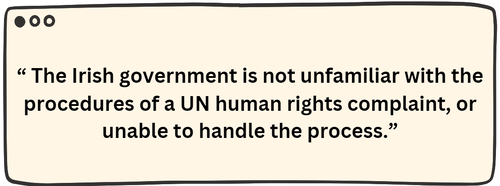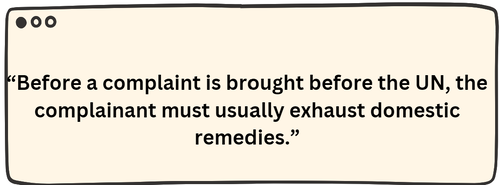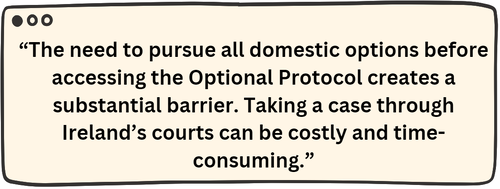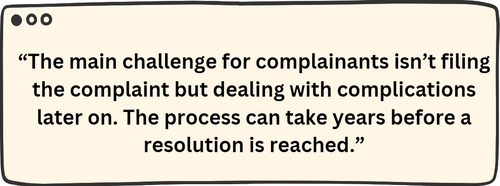Ireland's ratification of the Optional Protocol to the UN CRPD
November 6 2024, 11:21am

DFI has written a briefing note on Ireland's accession to the Optional Protocol below. You can download the paper here (PDF 198 KB).
1. Introduction
We welcomed the Irish government’s pledge on 8 October 2024,[1] to accede to (ratify) the Optional Protocol of the UN Convention on the Rights of Persons with Disabilities (UN CRPD). The formal process for accession is now done, and the Optional Protocol to the UNCRPD will come into effect in Ireland on the 30 November 2024.
DFI wants to give our members a clear picture of the implications of the ratification of the Optional Protocol. That’s why we’ve outlined here what ratification means, and attempted to demystify the UN human rights complaints process.
2. Legal Process
The Tánaiste and Minister for Foreign Affairs signed an instrument of accession on behalf of the Government which was deposited with the UN Office of Legal Affairs in New York on 31 October 2024.
The Optional Protocol to the UN CRPD enters into force on the thirtieth day after this. That means the Optional Protocol will take effect on 30 November 2024.
While the government’s delays on the Optional Protocol to the UN CRPD make this moment feel historic, this is not the first complaints mechanism Ireland has ratified. Ireland has ratified the following complaints mechanisms, with the year of ratification:
- The Optional Protocol to the International Covenant on Civil and Political Rights (ICCPR) (1989)
- The Optional Protocol to CEDAW (2000)
- Optional Protocol to the Convention on the Rights of the Child on a communications procedure (2014)
Ireland has been part of other treaty complaint mechanisms for some time and has dealt with complaints under these treaties. The Irish government is not unfamiliar with the procedures of a UN human rights complaint, or unable to handle the process.

3. Complaints Process
From 30 November, people in Ireland will be able to bring complaints to the UN Committee, if they satisfy certain conditions. First, and most important, before a complaint is brought before the UN, the complainant must usually exhaust domestic remedies.
This generally means you must have tried to solve your issue through domestic means, most commonly through the court system. This can mean anything from trying to have your complaint heard and being turned down, to going all the way to the Supreme Court.
It might also mean going through the Ombudsman or other bodies such as the Workplace Relations Commission. You don’t need to go through European Courts such as the European Court of Justice or the European Court of Human Rights. But you must show that your rights violation cannot be solved by domestic means. This requirement is only waived in extremely rare cases, when, for example, you can demonstrate that pursuing domestic remedies would be unsafe or futile.

The need to pursue all domestic options before accessing the Optional Protocol creates a substantial barrier. Taking a case through Ireland’s courts can be costly and time-consuming, sometimes taking years if it reaches the Supreme Court. While some people can get support from Free Legal Advice Centres (FLAC), Irish Human Rights and Equality Commission (IHREC), or the Legal Aid Board, this isn’t guaranteed. This highlights the need to push for full implementation of the UN CRPD, so fewer people have to file complaints.
Committees try to make filing a complaint as simple as possible. You don’t need a lawyer to submit one, but many people do use one. Complaints can be sent through an online form, or by post with a printed form.[2] The main challenge for complainants isn’t filing the complaint but dealing with complications later on. The process can take years before a resolution is reached.

The Committee started receiving complaints in 2010. Since then, it has resolved 81 complaints,[3] with 40 cases still pending – some dating back to 2018.[4] This means a decision could take up to six years. Even after a case is taken up, it can still take some time to resolve. For example, we can examine a recent case from France,[5] to get an idea of the time commitment involved:
Date | Action |
12 January 2018 |
The complaint is submitted to the Committee.
|
18 April 2018 |
The complaint is sent to the state party for response.
|
25 June 2018 | The state party responds. |
26 October 2018 | The complainant responds to the state party. |
23 January 2019 | The complainant responds. |
5 April 2019 |
The state responds.
|
13 June 2019 | The complainant responds. |
26 September 2023 |
The Committee issues its findings.
|
This process takes time, as the state and complainant exchange responses, and the Committee gathers all necessary information to make a decision. There can be a long wait between the time the information is submitted and when the Committee makes a decision.
Finally, the Committee’s decisions are recommendations, not enforceable orders. While it can issue statements, the Committee has no power to enforce them. However, states can take recommendations seriously, and they can have strong implications for policy.

4. Optional Protocol and a Disability Ombudsman
There has been some discussion about whether Ireland needs both the Optional Protocol and a Disability Ombudsman. Past cases suggest that an Ombudsman could complement the Optional Protocol. An Ombudsman could raise awareness of complaints, monitor whether the state follows orders for remedies like reparations, and encourage the state to adopt the Committee’s recommendations, along with handling local complaints.
1. Conclusion
When used correctly, and with a clear understanding of expectations, the UN human rights complaints process can be a useful tool for disability activists. However, the government’s long delay in ratifying the Optional Protocol may have created unrealistic expectations and raised its profile far beyond that of other complaints mechanisms. Public education will be needed to manage expectations of what the Optional Protocol can achieve, and how to use it effectively.
[1] https://www.gov.ie/en/press-release/aa312-government-announces-decision-to-accede-to-the-optional-protocol-to-the-un-convention-on-the-rights-of-persons-with-disabilities/
[2] https://www.ohchr.org/en/treaty-bodies/crpd/individual-communications
[3] UN Human Rights Jurisprudence database
[4] https://www.ohchr.org/sites/default/files/documents/hrbodies/crpd/2022-09-23/Table_pending_cases_CRPD.xlsx
[5]https://docstore.ohchr.org/SelfServices/FilesHandler.ashx?enc=6QkG1d%2fPPRiCAqhKb7yhshZEsQpq2VmlaFuT3ws7ySGR9Lq4aTta9j6QH%2b8vtS%2fMCS8uKEvB8a1TAj%2bIBK1XmbnNMkV%2fx69EHJeDJI0BmL%2fTTnw2TGS5yzX9On2i9ml3MYViIQ94L7KOm96FxctEjgODODyEGuFbFXUPDDaWXzc%3d
